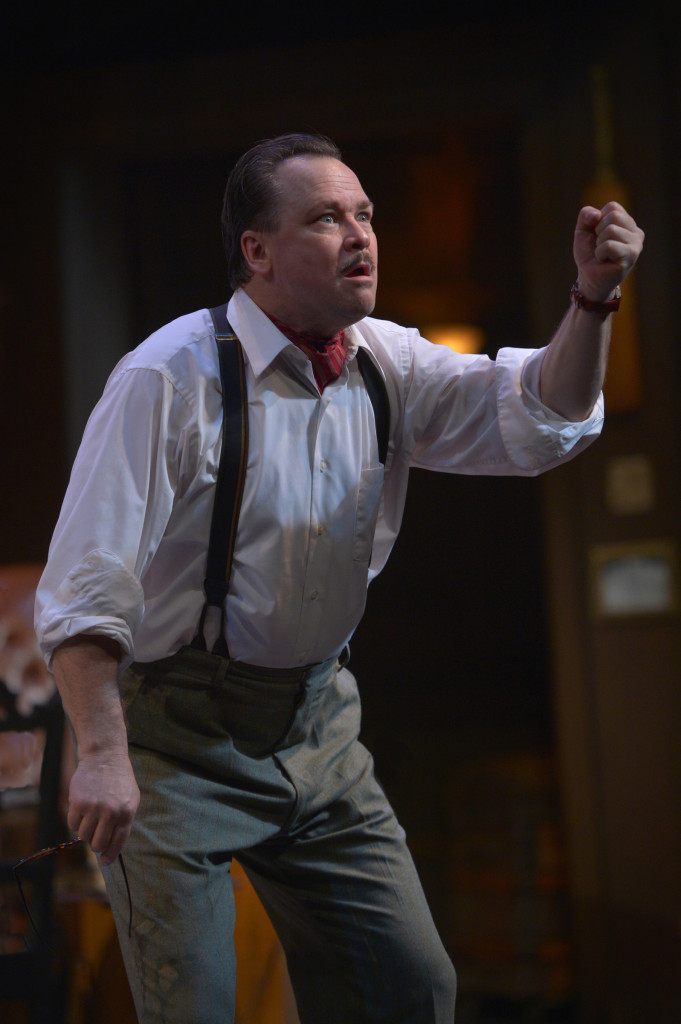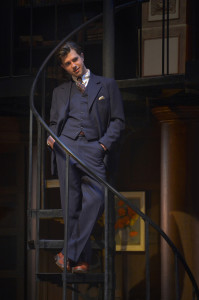
EQUITY ACTOR Kit Wilder aces the role of conniving author Andrew Wyke in “Sleuth,” at the Lesher Center for the Arts through April 26. Kevin Berne photos
As the play opens, crime novelist Andrew Wyke (Wilder) sits at his typewriter, delighting in his work. He strikes one final key with extended flair, coinciding precisely with the final note of the music emitting from his phonograph. Then, to fill the remaining minutes before his special guest arrives, he picks up and reads his typewritten pages aloud, acting each part with abundant gusto.
Playwright Shaffer leads the audience quickly from this seemingly ordinary scene through several increasingly surprising turns until, toward the end — unless you’ve seen the play before — it’s difficult to imagine what’s going to come next.
Shortly after young Tindle arrives, Wyke blurts out his reason for the invitation, telling Tindle he is aware that he wants to marry his wife. Tindle is visibly stunned but proceeds in as mature a manner as he can muster to address the matter. Wyke is quick to size up and dominate his naïve prey.
From the start, it is apparent that while Wilder takes his role seriously and plays it exceedingly well, Gorrebeeck seems to be focused elsewhere. His voice is so much quieter than Wilder’s, for example, that it is often uncomfortable to listen for him between Wilder’s well-projected musings.
Gorrebeeck’s accent is also uncertain. If director Mark Anderson Phillips wanted the actor to employ a Cockney accent, coloring him in a lower social class than his aristocratic rival, then Gorrebeeck achieves that quite well — in some instances. The accent comes through so strongly in some places that it is unmistakable, but mostly Gorrebeeck’s voice is simply quiet, listless and altogether indistinct.
Once the game is afoot and Tindle begins to realize what his host is really after, one would expect to feel a certain fearful tension develop between the two men. Instead, throughout their dealings Gorrebeeck’s character feels like a confused child rather than a nervous pawn. To his credit, once the action comes to a heightened climax at the end of the first act, Gorrebeeck does finally display an emotion that is realistic, and even powerful.In the second act, a detective (Philip Farrar as Inspector Doppler) arrives to investigate reports of suspicious activity in the neighborhood. Farrar is also weak, his character difficult to grasp, his voice understated and his manner toward homeowner Wyke strangely disconnected.
There are key moments in Shaffer’s play in which things take surprising turns, and their intended effect does come through in the Center Rep production. The oohs and aahs come out in all the right places. What’s lacking is a congruency between the central figures in the plot. The actors don’t appear to be on the same page — or if they are, then they’ve mastered those pages independently from each other.
There is certainly a great advantage to seeing “Sleuth” for the very first time. The twists and turns are best enjoyed when they are not expected. It’s a great story with a mysterious beginning, plenty of action and surprise, and a strong and distinct ending.
The play can stand without the element of interpersonal chemistry among the actors — but with it, the good play becomes great.
If I may use both hands, I give this production one thumb up and one down. If you’ve never seen it before, in film or on a stage, then I think you’ll enjoy it very much. If you’re already familiar with the story, though, you might find the Center Rep production lacking. If you go, please let me know! I would love to hear your impression.
If You Go
“Sleuth” continues at the Lesher Center for the Arts,1601 Civic Drive, Walnut Creek, through April 26. Tickets are $33 to $54 and are available by calling the box office at 925-943-7469 or online at lesherartscenter.org. Additional fees may apply.







Leave a Reply